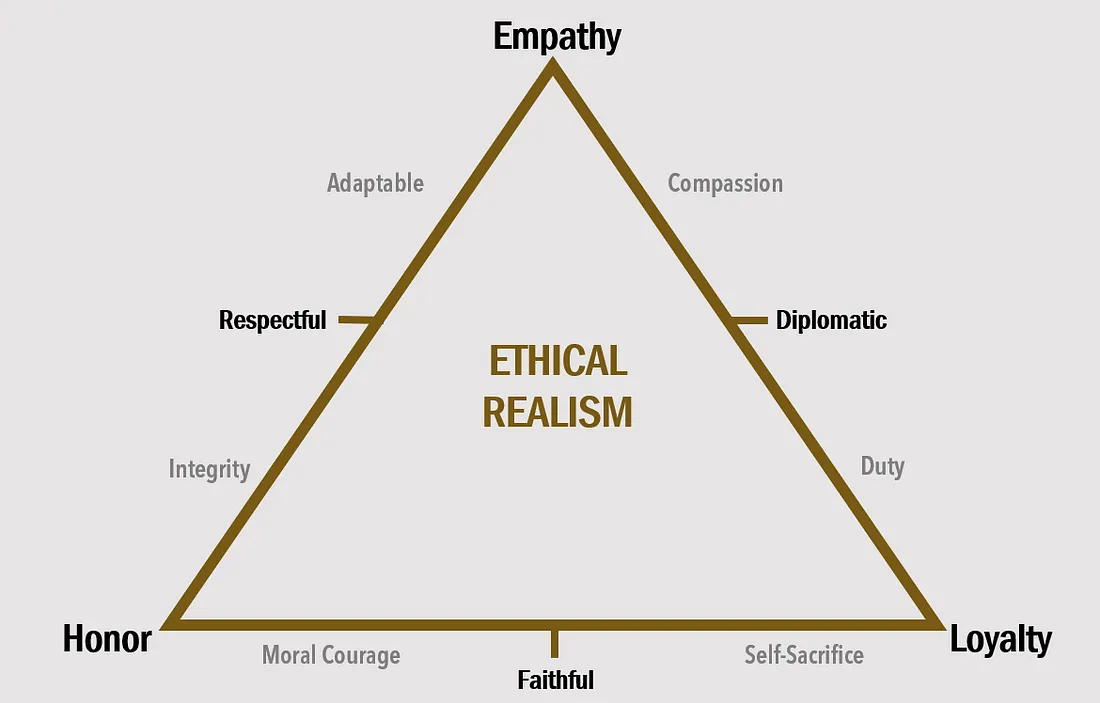Ethical Realism: Professional Character in Unconventional Environments
June 12, 2025
Blogs
In the unpredictable world of modern armed conflict, traditional virtues alone are no longer sufficient. Unconventional warfare (UW) demands a more nuanced model of leadership; one rooted in ethical realism, a fusion of unwavering moral character and the adaptive thinking necessary for ambiguous, high-stakes situations..
Navigating the Gray Zones
In unconventional environments, clarity is a luxury. Operators face shifting alliances, uncertain missions, and incomplete information. Such challenges don’t diminish the importance of core values but rather magnify their importance. Ethical realism anchors professional character in honor, loyalty, and empathy. Without these values, the operator risks descending into a Machiavellian mindset, justifying any means to achieve an end. But with these values, the operator becomes a steady moral compass amid chaos.
Ethical Realism isn’t just a philosophical stance; it’s a functional survival framework. Decisions made in seconds can have global consequences. The real question is not merely what to do, but how to do it rightly, when the path forward is unclear.
Duty Demands Integrity
The Navy SEAL Ethos declares, “I serve with honor on and off the battlefield,” and also, “The execution of my duties will be swift and violent when required.” These statements are not at odds. Doing what must be done means fulfilling duty — but always grounded in moral courage. True leadership arises not when everything aligns easily, but when values must be upheld amid complexity and cost. The standard is not perfection, but the standard does demand steadfast commitment to values, mission, and team.
Diplomacy Through Respect
Respect and diplomacy are mutually reinforcing. Together, they enable operators to stand firm on core values while building the relationships critical to mission success. Diplomacy — rooted in tact, cultural awareness, and emotional intelligence — is the oil in the gears of ethical realism. Combined with respect, diplomacy fosters adaptability without compromise.
For example, adapting uniform regulations and grooming standards to align with local customs can signal cultural respect. Just as important, demonstrating empathy, patience, and humility fosters trust and connection. Operators who can both respect cultural norms and lead with compassion are better positioned to set clear moral boundaries without sacrificing their credibility or influence.
Ethical Realism: Holding Honor, Loyalty, and Empathy in Tension
Ethical realism requires balancing three key virtues:
- Loyalty without Honor leads to blind obedience and ethical compromise.
- Honor without Loyalty fosters isolation from teammates and inflexibility in carrying out one’s duties.
- Honor and Loyalty without Empathy may accomplish the mission, but alienate those whose trust is essential.
The goal isn’t to elevate one virtue above the others but to hold all three in tension — each tempering the potential excesses of the others. For example:
- Letting empathy override honor and loyalty may result in abandoning one’s duty for acceptance.
- Prioritizing honor at the cost of empathy can erode rapport and alienate allies.
- Loyalty without empathy fosters compliance, not cooperation.
Effective leadership lies in maintaining equilibrium between these forces.
Ground Your Loyalty in What Is Honorable
Research by Milgram and Zimbardo in the 1960s revealed how easily social roles and authority can distort moral reasoning. In high-pressure environments, ethical action isn’t instinctive; it’s cultivated. Ethical action demands a well-defined moral compass, allegiance to something worthy, and the courage to act accordingly.
Loyalty must be grounded in honor. Detached from ethical foundations, loyalty becomes dangerous. Detached from duty, honor becomes self-serving. Ethical realism requires both to function together, guided always by empathy. As M. Scott Peck wrote in The Road Less Traveled, “The best decision-makers are those who are willing to suffer over the decisions they make.” To fully comprehend the human cost and still choose to act isn’t weakness. It is strength.
Whether on the battlefield or in any high-stakes profession, the faithful leaders are ones who fulfill their duty with honor and empathy…not because doing so is easy but because doing so is right. This is the essence of ethical realism and the foundation of enduring professional character.
Author’s Note: This model was originally developed over 20 years ago during the early stages of the war in Afghanistan to aid in the selection and training of special operations personnel assigned to work with the Northern Alliance. I remain convinced that this model’s relevance not only endures, but has become even more critical today as the Department of Defense navigates the complexities of Fourth Age Warfare.
Ethical Realism: Professional Character in Unconventional Environments was originally published in Horizon Performance on Medium, where people are continuing the conversation by highlighting and responding to this story.
